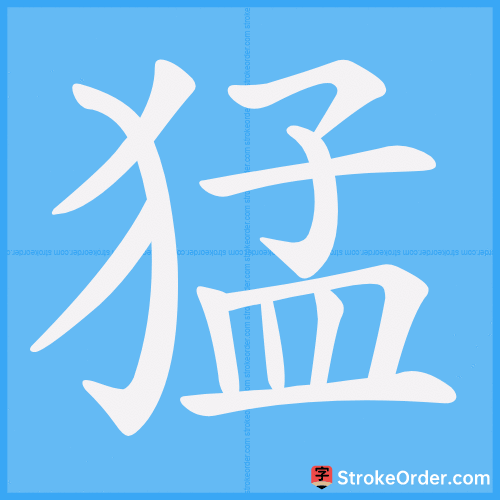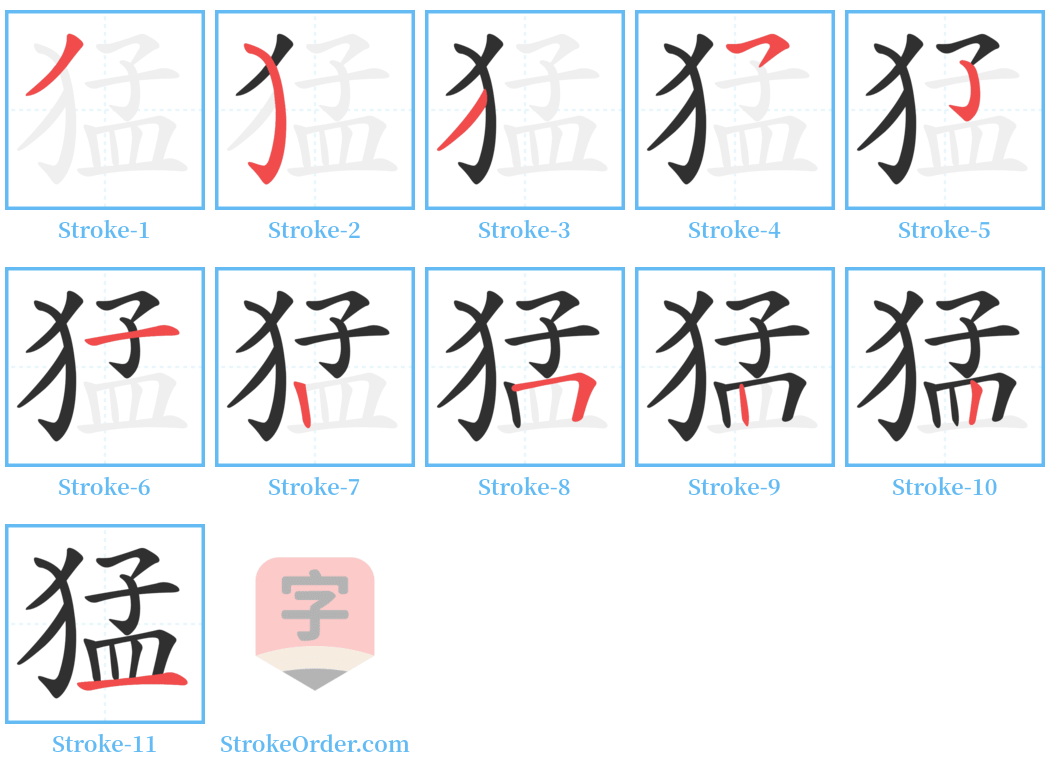猛 Stroke Order
Animated Stroke Order of 猛

Stroke Order Diagrams for 猛

Step-by-Step Handwriting Guide for 猛

Learn to Write Chinese Characters with Video Tutorials
Watch the video of writing the Chinese character "猛", learn the correct stroke order (笔顺) of the character "猛", and master the standard way of writing the character "猛".
Free Printable Handwriting Practice with Stroke Order: 猛
Printable Writing Practice Worksheet of "猛" in Portrait Orientation (Tian Zi Ge)

Printable Writing Practice Worksheet of "猛" in Landscape Orientation (Tian Zi Ge)

Information of 猛
Pinyin
měng
Radical
犭
Strokes
11 strokes
Usage
★★★★★
Definition
ferocious / suddenly / fierce / violent / abrupt
猛 [měng]
Noun:
1. A sizeable, forceful energy or strength. Examples: 猛将 (fierce general), 猛士 (valiant warrior), 猛烈 (intense), 勇猛 (brave and fierce).
2. Suddenness or abruptness. Examples: 猛然 (suddenly), 猛可 (all of a sudden), 猛不防 (unexpectedly).
3. Severity. Example: 宽以济猛 (to be lenient to mitigate harshness).
4. Ferocity. Examples: 苛政猛于虎 (tyranny is fiercer than a tiger), 猛禽 (ferocious birds), 猛兽 (fierce beasts), 猛戾 (brutality), 猛悍 (savage).
5. An ancient mammal, a woolly elephant. Example: 猛犸 (mammoth).
Adjective:
1. Fierce, ferocious, violent.
2. Valiant, brave, powerful.
3. Severe or harsh.
4. Intense, vigorous.
Adverb:
1. Suddenly, abruptly. Example: 猛不乍 (suddenly), 猛可 (suddenly).
2. Very, extremely.
Additional Information:
- Origin: The character means "strong dog."
- Etymology: A phonetic compound with the left part signifying dog (犬) and the right part representing the sound (孟).
Quotations:
1. "《说文》:猛,健犬也。" (Shuowen: "猛 means a strong dog.")
2. "《孟子》:驱猛兽。" (Mengzi: "To drive fierce beasts.")
3. "《韩诗外传》:公之狗甚猛。" (Han Shi Wai Zhuan: "The public's dog is very fierce.")
Examples of Usage:
- 大猛 (big dog)
- 猛利 (fierce)
- 猛戾 (brutal)
- 猛急 (irritable)
- 猛火 (fierce fire)
- 猛迅 (intense and rapid)
Input Method for 猛
Pinyin
meng3
Wubi
qtbl
Cangjie
khndt
Zhengma
qmyl
Four Corner
47212
Unicode
U+731b
Same Pronunciation Characters